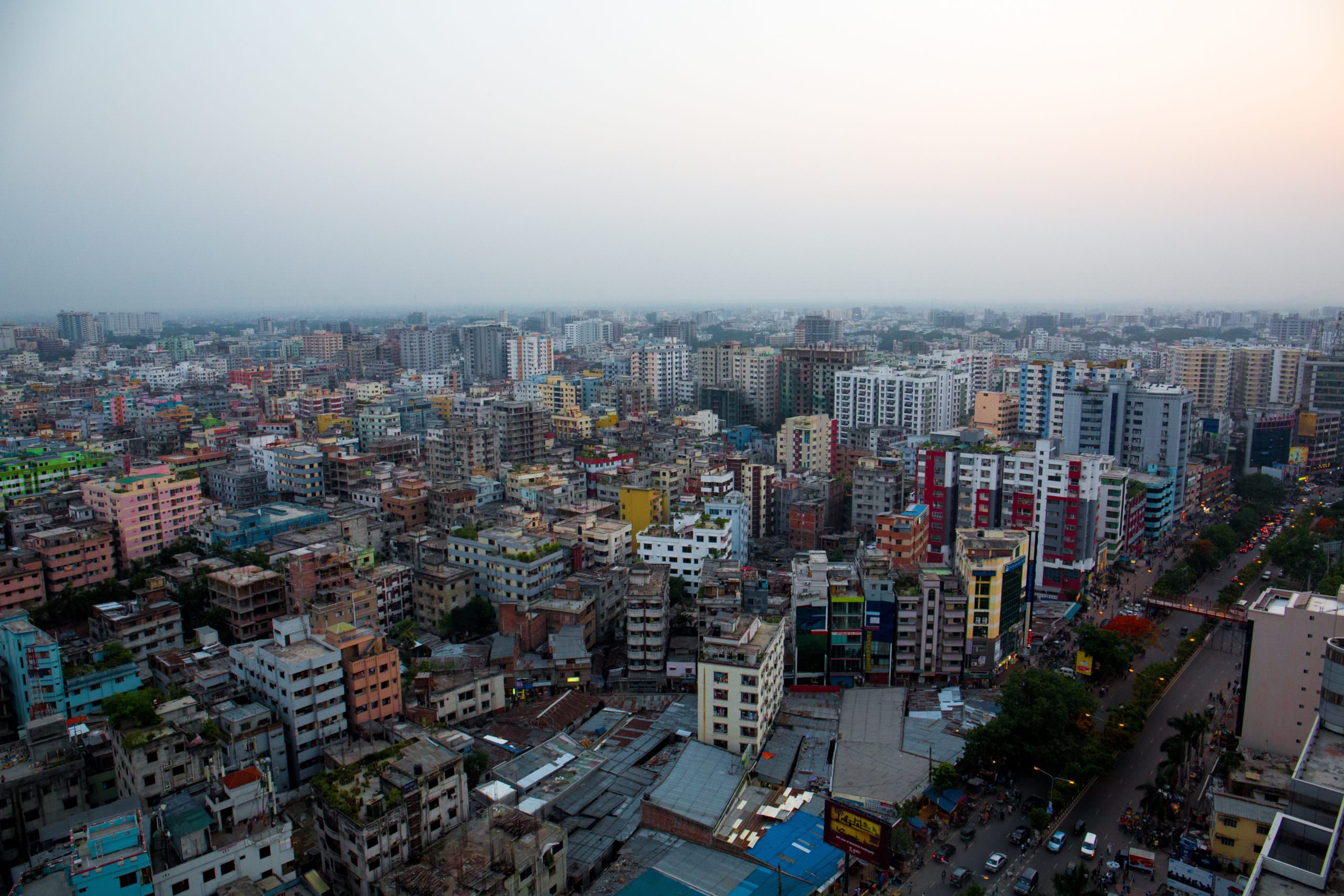
Aerial view of city in Bangladesh. Photo by Kelly Lacy.
Recently, the Mittal Institute held a webinar to delve into the status of entrepreneurship in South Asia amidst the COVID-19 pandemic. In it, the discussion focused on the extent to which entrepreneurs in the region have been able to limit the damage and distress caused by the pandemic by partnering with state and civil society, while exploring new opportunities that a possible “global reset” has opened up to the developing world.
We spoke with webinar panelist Rajeeb Samdani — Managing Director of Golden Harvest Group, Co-Founder and Trustee of the Samdani Art Foundation, and a member of the Mittal Institute’s Arts Advisory Council — to learn more about how the pandemic has impacted business in Bangladesh, and to gain insight into the nation’s many unique qualities that have quickly made it an economic powerhouse in the region.

Do you think the growth rate of Bangladesh will decline due to COVID-19? What about in comparison to neighboring countries?
Bangladesh is the fastest growing country in Asia right now, but the pandemic is going to affect everyone’s growth rate. Throughout South Asia, Bangladesh and its neighboring countries are affected, and right now Bangladesh’s growth rate is lower than expected. But Bangladesh is growing at a rate of 8% this year and more than 6% over a decade, and it still has that momentum going. Regardless, this is a hiccup not just for us, but for everyone.
The entrepreneurs of Bangladesh are now looking at alternative solutions. While our regular exports may have been affected, we are now exporting PPE: masks, gloves, and so on.
Has Bangladesh witnessed increases in the price of goods during the pandemic?
If you look at the commodity market, many things are related to one another. As for bulk commodities, when petroleum prices fell, commodity prices also declined. In Bangladesh we haven’t faced a change with food. As a commodity broker, I know that the commodity market is always fluctuating. During the lockdown when oil prices fell, commodity prices also fell. Yet, we haven’t seen food prices increase much during the pandemic in Bangladesh. The government has actually opened different outlets all over the country where different daily foods are sold, such as rice and oils, at a subsidized price. At the same time, those who are in the processed food business are trying to incorporate bulk packaging to reduce price changes to the customers.
What sort of impact would the US-China trade war alongside the COVID-19 pandemic have on business in Bangladesh?
In general, when it comes to the US-China trade war, I think Bangladesh is in a good position. Japan and South Korea are now looking at Bangladesh. These countries have investments in China, but they’re now seeking alternative areas due to the US-China trade volatility. These countries are willing to shift their business to Bangladesh, and that is where Bangladesh will have a great opportunity moving forward.
Bangladesh has created its economic zones keeping foreign investors in mind, and this is alluring for people who are looking at this country for labor-intensive work. Our literacy rate is high, we have a huge educated workforce, and with these things together, it’s hard to beat Bangladesh in financial attractiveness. Bangladesh will continue to enjoy great opportunity in economic zones and high-tech parts.
What are the applications and appeal of emerging blockchain technology in Bangladesh?
Even 10 years back, only a fraction of our population had access to the internet, and now it’s more than 65%. When Prime Minister Sheikh Hasina came into power, one of her election manifestos was a digital Bangladesh and increased investment in IT — a sector that had been totally neglected in Bangladesh. But now we have so much development in IT infrastructure, and continuing that, the Bangladesh government is working to introduce blockchain technology by 2030. The reason to introduce this technology is to increase transparency, efficiency, and reduce cost and the potential for corruption.
There are plans to introduce blockchain tech into many sectors: financial, government, healthcare, cybersecurity, agriculture, and more. Plus, historically, land organization has always had a lot of issues. Bangladesh became independent in 1971, and before that it had one area that was part of Pakistan, and even before that in 1947 was the Partition of British India. Because of that, there are many disputed properties since land was always changing hands and maps were constantly altered. This is one area where the government wants to particularly focus blockchain technology.
Is a public-private partnership such as BRAC-Bangladesh Government sustainable in the long-run? Is it beneficial for a government to have these partnerships?
This public-private type of partnership in Bangladesh is something that started in the last decade, and we are seeing more and more of it. But it depends a lot on the government, because at the end of the day, it’s the government that takes the first step in this partnership. BRAC is the world’s largest NGO, and during this difficult time, BRAC has been working at the front lines and has a presence in every corner of Bangladesh. They can also review cases much faster than the government. Yet this partnership shows that the beauty of our government is that it is very open.
I’ve created the Dhaka Art Summit, which is partnered with the Bangladesh government. Their practice is that if you bring to them a great idea, they will facilitate it and support you if they can. The Bangladesh government providing funding and support is a unique example in South Asia.
It’s good for a government to have these partnerships, because it encourages the private sector to improve on creativity and ideas. In that sector, when you want to do something larger scale, it can be difficult sometimes without government support. A lot of South Asian countries can take this example of what we are doing in Bangladesh today and use it for themselves. We are all going through difficult times right now in this pandemic, but there are so many examples of people working together to achieve something. Bangladesh has been through a lot; we’re just 49 years old, but we have come a long way, and the people of Bangladesh always work together. The government in power wants to encourage the private sector, and together we will build a better Bangladesh.
———————
☆ All opinions expressed by our interview subjects are their own and do not reflect the views of the Mittal Institute and its staff.
